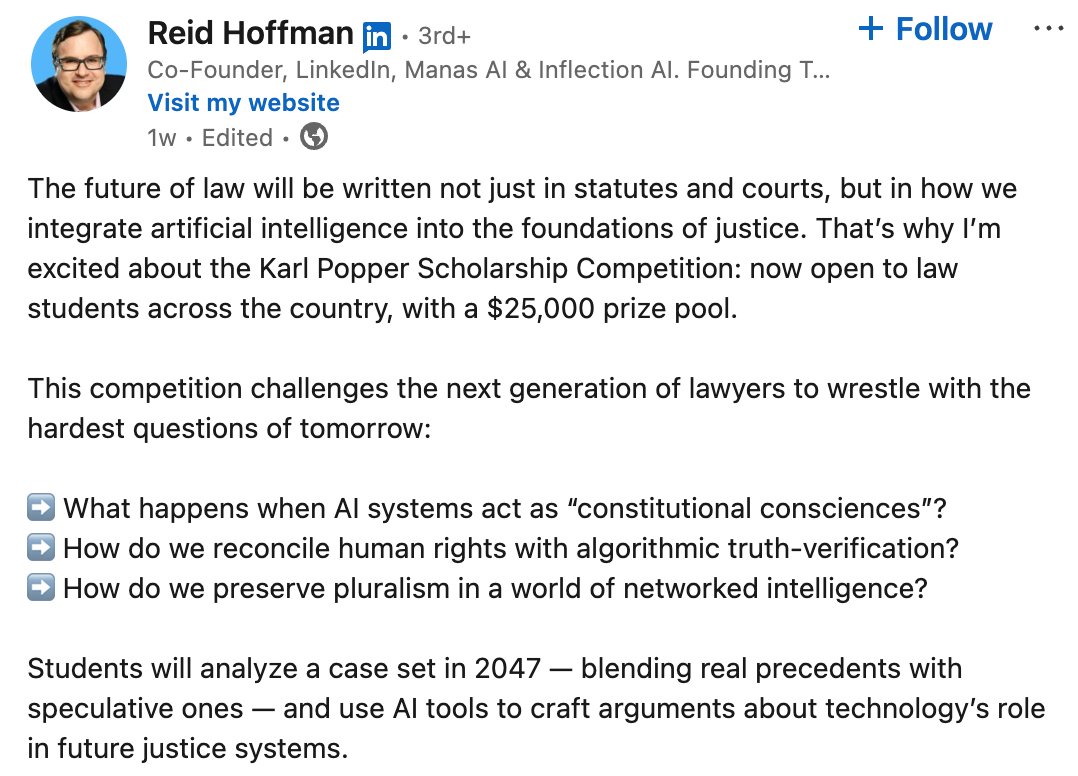In 2047, Ahmad Hakim and his household are local weather refugees fleeing the Levantine Consolidation Zone after Ahmad refused to put his daughters in obligatory fertility conscription. The household seeks sanctuary in CoralNet, a neighborhood ruled although “judicial meshes” combining human, AI, and nonhuman views. It’s unlikely that we’re lower than 25 years away from animals weighing in on judicial choices, however I, for one, welcome our new Orca overlords — they appear to have the proper thought. Authorities deny sanctuary to Ahmad himself, whereas provisionally granting sanctuary to his spouse and kids, on the grounds that Ahmad refuses to permit AI copilots for himself or his kids, refuses verification literacy coaching, and rejects CoralNet’s epistemic infrastructure.
As a hypothetical, it goes quite a bit additional on the market than your 1L Torts ultimate. That is the background for the Karl Popper Authorized Reasoning Scholarship competitors, difficult regulation college students to navigate a future dominated by “synthetic intelligence, local weather change, and evolving ideas of personhood and humanism” in addition to rising world authoritarianism. Regulation college students are given an outline of the case and a physique of actual and hypothetical precedent, and requested to enter a 2000-5000 phrase submission within the type of both a celebration transient, a judicial opinion, or a scholarly evaluation.
And, in step with an AI-driven future, college students aren’t solely allowed, however inspired to make use of AI of their submissions.
The competitors has $25,000 prize pool and is open to JD/LLB, LLM, SJD, and PhD candidates, both working solo or in groups as much as three. First prize earns $10,000, the 2 runners-up obtain $2,500 every, and 7 finalists will take dwelling $500. The deadline is October 10, 2025, 23:59 UTC.
LinkedIn cofounder Reid Hoffman took to, effectively, LinkedIn to specific his curiosity within the competitors:

The way forward for regulation being written by “how we combine synthetic intelligence into the foundations of justice” sounds appropriately dystopian, however the current of regulation is written by a mixture of Calvinball and “who paid for Clarence Thomas’s final trip,” so perhaps ChatGPT ought to take a stab at it.
There’s an AI government on the market claiming his AI can substitute human judges. He’s additionally an fool.
However even when synthetic intelligence received’t take its place within the foundations of justice, it’s definitely going to reshape the authorized workflow. Legal professionals already use these phrase calculators the identical approach they traditionally used junior associates, to write down first drafts that get marked up sufficient to make Theseus wince. Judges may also make use of extra AI of their course of, even when they don’t wish to, as authorized analysis merchandise combine increasingly AI on the backend.
AI hallucinations have embarrassed attorneys up and down the status scale. The perfect hope for the following era of attorneys is to get them actively using the expertise early to allow them to determine what it may and can’t truly do. Regulation faculties will harbor comprehensible skittishness about turning college students unfastened on AI-assisted initiatives, making competitions like this one all of the extra vital.
Past the expertise, the competitors asks an fascinating philosophical query, impressed by Karl Popper himself, in regards to the limits of tolerance. Popper famously warned that tolerance requires a society to be illiberal of intolerance, a well timed maxim to recollect as a few of the loudest calls for for “free speech” come from these preaching intolerance. How does a society stability open discourse with a tolerating a media panorama constructed round hijacking it for fascist ends? The perfect reply traditionally is to let the viewers communicate freely themselves: to protest, to mock, and to boycott. These rights of the viewers have come beneath assault from those that wish to say that free speech is the affirmative proper to be protected against criticism. This interpretation, couched within the language of freedom, was all the time a precursor to fascism as a result of its elementary logic rests on coercive authorities motion to silence opposition. So once we begin seeing FCC licenses dangled to get late-night hosts eliminated for making jokes, it’s only one extra step on the highway to eroding the guardrails defending society from intolerance.
However, Popper’s tolerance paradox goes deeper than speech, the hypothetical asks about granting asylum to a father who espouses racist and misogynist views that conflict with the neighborhood whereas holding a household fleeing persecution collectively. Ought to a society search to maintain out intolerance at the price of punishing the entire household? When ought to the state sacrifice cultural pluralism to guard the person rights of the relations? Then throw the idea of compelled AI copilots onto all this.
It’s a captivating competitors. Learn extra about it right here. And bear in mind, you could have till October 10, 2025, 23:59 UTC to enter.
 Joe Patrice is a senior editor at Above the Regulation and co-host of Considering Like A Lawyer. Be at liberty to e mail any suggestions, questions, or feedback. Comply with him on Twitter or Bluesky for those who’re fascinated about regulation, politics, and a wholesome dose of school sports activities information. Joe additionally serves as a Managing Director at RPN Govt Search.
Joe Patrice is a senior editor at Above the Regulation and co-host of Considering Like A Lawyer. Be at liberty to e mail any suggestions, questions, or feedback. Comply with him on Twitter or Bluesky for those who’re fascinated about regulation, politics, and a wholesome dose of school sports activities information. Joe additionally serves as a Managing Director at RPN Govt Search.






